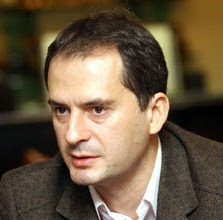Photo: footboots.ru
Anastasia Balezdrova
The strange symbiosis of the far left radicals of SYRIZA with the Independent Greeks party in the new Greek cabinet was surprising to the international community. It was even more astonishing how fast it was formed, in less than 24 hours after the early parliamentary elections on Sunday.
A day later, Greece had officially referred to procedural reasons to oppose the opinion of the European Union against the actions of Russia in Ukraine, and today, new Minister of Foreign Affairs Nikos Kotzias boycotted the decision to impose new sanctions on Moscow.
And while local analysts were wondering whether this was an abrupt change in Greece’s geopolitical orientation from West to East or not, publications in the international media revealed Kotzias’ links with Russia’s extreme nationalist Aleksandr Dugin, the purpose of which is to implement Russia’s interests in Greece. According to them, the coalition between SYRIZA and Independent Greeks had been organised well before the elections, with the help of a former Russian diplomat in Athens and a current associate of an oligarch close to the Kremlin.
 One source of information referred to by the authors of articles in the international press is the blog of Hristo Grozev, a media investor present in the Netherlands and Ukraine, and analyst of Russia’s policy during the conflict.
One source of information referred to by the authors of articles in the international press is the blog of Hristo Grozev, a media investor present in the Netherlands and Ukraine, and analyst of Russia’s policy during the conflict.
In your blog, you describe the attempts of introducing Russian interests in Greece through the formation of a lobby financed by oligarchs. What is your source of information?
I mainly analyzed a large volume of correspondence, almost 1,000 e-mails, in the period 2013-2014. It was the correspondence of a key figure in the entourage of Russian oligarch Konstantin Malofeev, the man for whom there is sufficient evidence for him having initiated and funded, to a large extent, the separatist rebels in eastern Ukraine.
In early December, the Russian hacking group Shaltay-Boltay (part of the international hacking group Anonymous International) hacked the mailbox of George Gavrish, a former employee of the Russian consulate in Athens and currently an associate of Malofeev and of one of the extreme ideologists of Russian nationalism, Aleksandr Dugin. Gavrish is the main point of contact between the group Malofeev-Dugin and the Greek political elite, especially the group of SYRIZA. Obviously, these relationships were cultivated over the years when he was in Athens.

Aleksandr Dugin, photo: Ria Novosti
What exactly would this Russian lobby work for in your opinion? Would it be only in favour of energy projects or of other issues as well?
I think that the interests are more complex. In the correspondence, we see a detailed memorandum written by Aleksandr Dugin, which sets the goal of creating an "elite club" of international political figures to support Russia’s geopolitical interests, whatever they may be at the time. In this context, the most important thing for Russia is to break the hoop of isolation imposed on it by the European Union and the United States due to its role in Ukraine. That is why the first "aid" on the part of the new Greek government is in this direction, namely to "boycott" the sanctions on Russia at the EU level. Later on, the interests that will require assistance probably will be different, including energy.
What is important to understand is that an oligarch such as Malofeev does not work solely for his own interests. His role in Ukraine was to achieve "symbiosis" with the Kremlin - he financed the first, the riskiest part of the war and then subsequently, the first victories were handed to Putin on a silver platter. In return, he was reprieved by Putin in connection with his problems with the law. In 2013, he was accused of embezzling shares in a state-owned enterprise and now he is no longer a defendant.
Do you know who the members of this lobby in Greece are?
There is specific data in the correspondence for some of them. For example, one of the founders of the "anti-memorandum" movement within SYRIZA is influential blogger Dimitris Konstandakopoulos and current Minister of Foreign Affairs Nikos Kotzias, which is more important. Both had regular contacts with Gavrish and with the group around Malofeev through him.
Moreover, they had often sent party documents such as memoranda, strategies, etc. in Moscow, before they were officially published in Greece, which speaks for communication that is far from being only harmless and professional.
Furthermore, in 2013 and 2014 Kotzias ordered and sent to Moscow a series of detailed studies on the public attitude towards Russia in Greek society. The question is why he ordered them, at whose expense, why he sent them precisely to Gavrish.